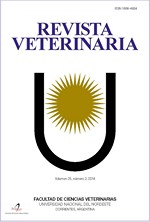Effect of royal jelly on bovine sperm characteristics during post–thaw incubation in vitro
DOI:
https://doi.org/10.30972/vet.2121747Palavras-chave:
cattle, sperm, royal jelly, longevity, viabilityResumo
Cryopreserved bovine semen is generally considered to have lower fertility compared to fresh semen. The reduction arises from both a lower post–thaw viability and a possible sublethal dysfunction of the surviving sperm population. The present study was conducted to observe the effect of royal jelly (RJ) on motility, viability and acrosome integrity of spermatozoa during post–thaw incubation. Frozen–thawed semen samples were washed and incubated at 37°C in Tris buffer containing 0.1, 0.2, 0.3, 0.4, 0.5% RJ or none (control). Sperm motility, viability and acrosomal integrity were assessed at 0, 0.5, 1, 1.5 and 2 h. The percentages of sperm motility, viability and intact acrosome were higher in Tris buffer containing 0.4% RJ compared to control (p < 0.05). After 2 h of incubation the percentages of motility, viability and intact acrosome of spermatozoa, respectively, were 52.3; 52.5 and 19.8% in 0.4% RJ containing buffer. Results indicate that the addition of 0.4% RJ in the incubation media was able to maintain better quality and longevity of spermatozoa. Royal jelly may be used as a semen extender to improve sperm quality and fertility.Downloads
Downloads
Publicado
Como Citar
Edição
Seção
Licença
Copyright (c) 2010 Saber Mohammed Abd–Allah

Este trabalho está licenciado sob uma licença Creative Commons Attribution-NonCommercial 4.0 International License.
Política de acceso abierto
Esta revista proporciona un acceso abierto inmediato a su contenido, basado en el principio de que ofrecer al público un acceso libre a las investigaciones ayuda a un mayor intercambio global de conocimiento. La publicación por parte de terceros será autorizada por Revista Veterinaria toda vez que se la reconozca debidamente y en forma explícita como lugar de publicación del original.
Esta obra está bajo una licencia de Creative Commons Reconocimiento-NoComercial 4.0 Internacional (CC BY-NC 4.0)










.jpg)
.jpg)



